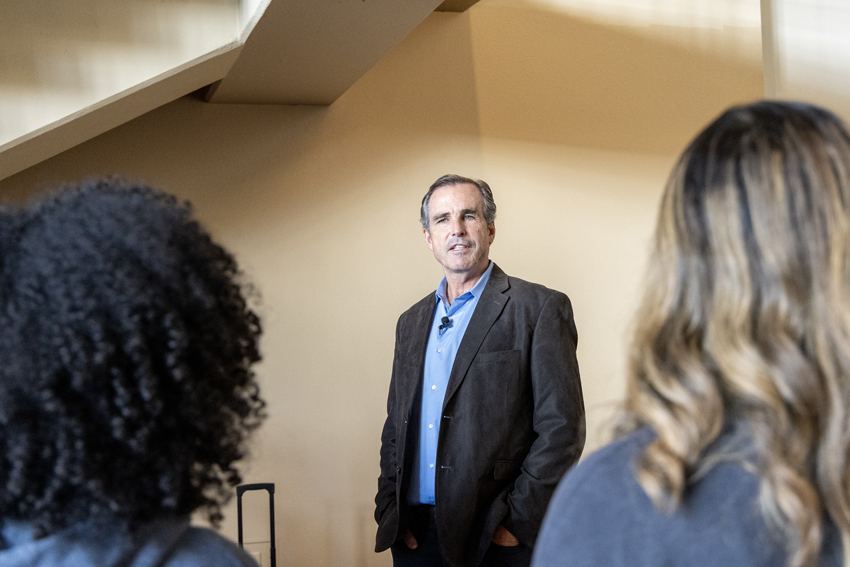“It was April 7, 2010,” Ramandeep Singh, ’12, said. “I was shocked. I didn?t know how to react. At first I didn?t believe it. It was like it came out of nowhere.”
For many people, the concept of death can be completely foreign; the closest thing they might have lost is a pet frog, or a great aunt who was rarely seen and not well known.
But for Raman, death took a personal turn when his father, Paramjit, passed away.
“Mr. [Todd] Bennett [principal] called me out when we were eating lunch and asked me to come into his office. Then I saw my tutor who I have had since I was a little kid. At first I was a little nervous, because I thought it was about my grades and stuff,” Raman said. “Then she starts crying: ‘Something terrible has happened,’ she says, so of course at this point I was just confused. She then went on to tell me that my dad died.”
Paramjit left behind his wife, Gurjit, and two sons, Ramandeep (“Raman”) and Kiranpreet (“Preet”), ’08 alumnus. At some point, everyone will be forced to cope with the death of someone close. But for the Singh family, this inevitability occurred sooner than for most.
“To be honest, the first thought was ‘Let’s take names and kick in some doors,'” Raman said. “I was angry the whole time while in the office. It was as if I was going to get into a fight. But, somehow, I still felt like my dad was holding me back. He wouldn’t want me to do anything I would regret: We’re not like them and we won’t stoop down to their level.”
Time alters attitudes
While anger was his first emotion, Raman’s feelings changed as the weeks passed.
“The first day I felt like ‘Whatever, I’ll live,’ but then the next day came, and I fell back into reality; I knew he was gone,” Raman said. “I began bawling out of nowhere, just because I saw my dad’s picture on my phone. I didn’t want to cry in front of my mom, because then she would start crying, and I wanted to be strong for her.”
Raman’s experience shows that the immediate emotion felt is not always the one that lasts. Although he could have responded in a number of ways, his choice proved to be a mature one.
“When I came back to school, I think everybody expected me to be angry,” Raman said. “Instead, I came with a smile.”
Since “stuff happens,” Raman does not look at the world with depression or blame, he said. Rather than feel hatred or despair, he remembers his father as an inspiration to continue on in his life.
“My dad would tell me, when I was a little kid, that you gotta be brave through all the rain and the pain,” Raman said. “You can’t just be sitting around moping; you gotta strive and you gotta get up. He was an inspiration to me. When he came into this country, he had nothing and his mother died; he still overcame all of that.”
Changing family dynamics
Following the death of their father, Raman and Preet had to take on greater responsibility in their house.
“My mom and grandma took it pretty hard and were really sad,” Raman said. “They told my brother and I that we were their hope that holds them up. That’s why I need to stay strong and keep smiling. I can’t be angry at the world.”
Although his brother was unresponsive in the beginning, Raman said that he has come to be a vital part of the Singh family dynamics.
“For the first week, my brother just sat in his room, silent,” Raman said. “He didn’t really show any sign of emotion — he was just completely silent. Now things are better. He helps my mom with the bills and other stuff, and has really stepped up in the house.”
Looking forward
As emotions vary from person to person, Gurjit has had a different experience in dealing with the loss of her husband.
“It’s been over six months since this happened, but I still find it difficult to believe that he has left us forever,” Gurjit said. “My decision to continue with my schooling has helped a lot to deal with this grieving.”
Through completing her process of becoming a registered nurse, Gurjit aims to help her sons achieve their passions, which was also their father’s wish. Looking to the future has helped the Singh family to cope with their loss.
“Through all of this positive thinking, it is giving us motivation and keeping us together,” Gurjit said. “Although financially it has been difficult, we continue to think positive to achieve our objective.”
Memories of Paramjit
While there are many ways to remember a person, Raman feels that reflecting on his experiences with his father is the most significant means.
?Lots of people like to go and look at pictures and other belongings of a person who has died,? Raman said. “For me, it’s different; instead of pictures, I like to remember the actions and time we spent together. That is the most memorable thing for me.”
Raman’s favorite memory of him and his father was when they used to wrestle each other, he said.
“My dad used to say to me when we wrestled, ‘Come on, you’re not even trying,’ when really I was trying as hard as I could to beat him,” Raman said. “I never could win, and I always played it off like I wasn?t trying. I would look back and think, ‘My dad is so strong, it’s not even funny.'”
While some may think that they will not experience the death of a parent until they are an adult, the fact of the matter is that all over the world children are left without a parent. In this situation, Raman would advise kids to refrain from adopting a negative outlook.
“You can’t be angry at the world — that’s just part of life,” Raman said. “Sure, I miss my dad and wish he was still here. If you never let it go, you will always be angry. All you can do is keep smiling.”
Both Raman and his mother remember Paul, as they called him, as a strong man who led his family as best as he could.
?He was a dedicated family man, a loving father, a caring husband and a compassionate person towards all his friends,” Gurjit said. “He always offered his hand to the needy people around him. All his life he worked hard so that his family had financial security and they need not go through any of hardships that he went through himself. His physical absence will be felt always in our lives.”
For more stories of students who have suffered loss, read the May 21, 2008, article, Tragedy shapes character, fortifies faith.






